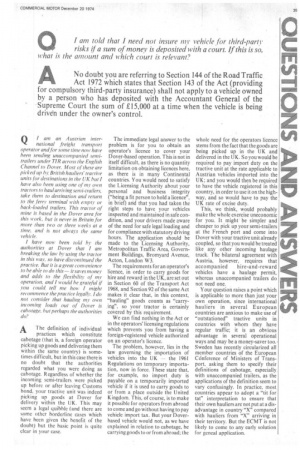Q I am an Austrian inter national freight transport operator
Page 37

If you've noticed an error in this article please click here to report it so we can fix it.
and for some time now have been sending unaccompanied semitrailers under TIR across the English Channel to Dover. Most of these are picked up by British hauliers' tractive units for destinations in the UK hut I have also been using one of my own tractors to haul arriving semi-trailers. take them to destination and return to the ,ferry terminal with empty or back-loaded trailers. This tractor of mine is based in the Dover area for this work, but is never in Britain for more than two or three weeks at a time, and is not always the same vehicle.
I have now been told hr the authorities at Dover that I am breaking the law by using the tractor in this way, so have discontinued the practice. But it is a great convenience to he able to do this— it saves money and adds to the .flexibility of my operation, and I would he grateful if you could, tell me how I might recommence the practice legally. I do not consider that hauling my own incoming loads out of Dover is cabotage, hut perhaps the authorities do?
A The definition of individual practices which constitute cabotage (that is, a foreign operator picking up goods and delivering them within the same country) is sometimes difficult, but in this case there is no doubt that the authorities regarded what you were doing as cabotage. Regardless of whether the incoming semi-trailers were picked up before or after leaving Customs bond, your tractive unit was indeed picking up goods at Dover for delivery within the UK. This may seem a legal quibble (and there are some other borderline cases which have been given the benefit of the doubt) hut the basic point is quite clear in your case. The immediate legal answer to the problem is for you to obtain an operator's licence to cover your Dover-based operation. This is not in itself difficult, as there is no quantity limitation on obtaining licences here, as there is in many Continental countries. You would need to satisfy the Licensing Authority about your personal and business integrity ("being a fit person to hold a licence", in brief) and that you had taken the right steps to have your vehicles inspected and maintained in safe condition, and your drivers made aware of the need for safe legal loading and for compliance with statutory driving hours. The application should be made to the Licensing Authority, Metropolitan Traffic Area, Government Buildings, Bromyard Avenue, Acton, London W3.
The requirements for an operator's licence, in order to carry goods for hire and reward in the UK, are set out in Section 60 of the Transport Act 1968, and Section 92 of the same Act makes it clear that, in this context, "hauling" goods counts as "carrying", so your tractor is certainly covered by this requirement.
We can find nothing in the Act or in the operators' licensing regulations which prevents you from having a foreign-registered vehicle authorized on an operator's licence.
The problem, however, lies in the law governing the importation of vehicles into the UK the 1961 Regulations on temporary importation, now in force. These state that, for example, no import duty is payable on a temporarily imported vehicle if it is used to carry goods to or from a place outside the United Kingdom. This, of course, is to make it possible for operators from abroad to come and go without having to pay vehicle import tax. But your Doverbased vehicle would not, as we have explained in relation to cabotage, he carrying goods to or from abroad; the whole need for the operators licence stems from the fact that the goods are being picked up in the UK and delivered in the UK. So you would be required to pay import duty on the tractive unit at the rate applicable to Austrian vehicles imported into the UK; and you would then be required to have the vehicle registered in this country, in order to use it on the highway, and so would have to pay the UK rate of excise duty.
This, we think, would probably make the whole exercise uneconomic for you. It might' be simpler and cheaper to pick up your semi-trailers at the French port and come into Dover with your tractive unit already coupled, so that you would be treated like any other incoming haulage truck. The bilateral agreement with Austria, however, requires that accompanied hire-and-reward vehicles have a haulage permit, whereas unaccompanied trailers do not need one.
Your question raises a point which is applicable to more than just your own operation, since international hauliers in several European countries are anxious to make use of "outstationed" tractive units in countries with whom they have regular traffic; it is an obvious advantage in several operational ways and may be a money-saver too. Sweden has recently circularized all member countries of the European Conference of Ministers of Transport, asking them to specify their definitions of cabotage, especially with unaccompanied trailers, as the applications of the definition seem to vary confusingly. In practice, most countries appear to adopt a "tit for tat" interpretation to ensure that their own hauliers are not put at a disadvantage in country "X" compared with hauliers from "X" arriving in their territory. But the ECMT is not likely to come to any early solution for geneal application.




















































































